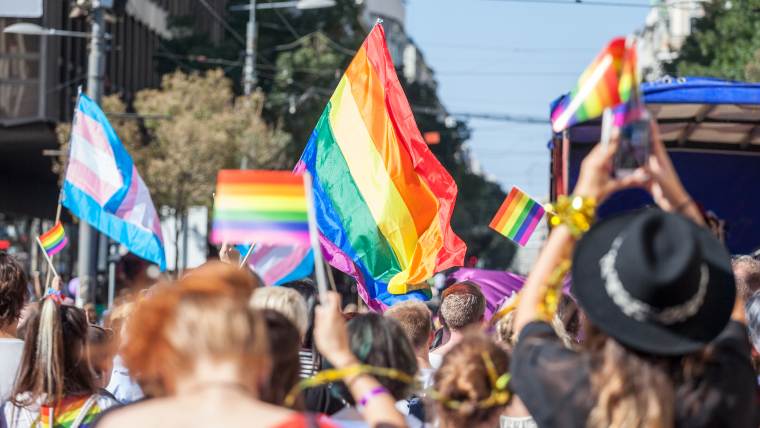Regaining Pride in My Finances: A Queer Journey From Struggle to Strength

This year, Pride Month looks different than it has before. Most obviously, the Coronavirus forced Pride organizations across the country to cancel in-person events, eliminating one of the most visible components of the month-long celebration. It’s also taking place at the onset of a new economic reality that makes the moment more introspective than in years past.
Suddenly, millions of people are experiencing unexpected financial hardship because of the economic fallout, creating a very different dynamic for Pride this year. Pride Month 2020 presents a chance to be more self-reflective – more focused on personal growth (or survival) than collective enthusiasm.
Personally, I’m excited about this. My coming out story and my financial journey are inextricably linked, a reality that's shared by many of us in the LGBTQ community. Pride month is, among other things, about liberation, something that we should experience in our finances, too.
Common Financial Struggles Within the LGBTQ Community
#1 Keeping up with the queer Joneses
For many in the LGBTQ community, creating and maintaining an image of success – however loosely defined – has become the norm. Undoubtedly, there are many reasons for this.
For some, a perfectly curated Instagram feed presents an image of LGBTQ prosperity that must be attained, regardless of how much credit card debt it takes to achieve. Others, wounded by family and friends, use retail therapy in an attempt to heal, a practice that ultimately fails to fill the void while often creating copious amounts of debt.
For me, after coming out to my family, I felt an incredible pressure to present a successful picture of myself in an effort not to further disappoint them. Knowing that rejection could be around any corner, I made risky financial decisions (including credit card debt, an adjustable-rate mortgage, and cars I really couldn’t afford) to protect myself against the potential for rejection. Ultimately, I repelled healthy relationships, exchanging them for attempts to impress people in the hopes of earning their tolerance or acceptance.
In reality, we don't have anything to prove to anyone. Instead, we have a responsibility to ourselves to take our financial health seriously, ensuring that we are positioned to thrive now and in the future.
#2 Expedited adulthood
While some in the LGBTQ community are blessed by supportive friends and family when they make their sexual orientation public, too many face a serious support crisis. It’s not a coincidence that 40% of the 1.76 million young people who experience homelessness each year identify as LGBTQ. What’s more, nearly half ran away because of family rejection, 43% were forced out by parents, and a significant number experienced physical, emotional, or sexual abuse at home.
Regardless of the circumstances, expediting the transition to adulthood is common among LGBTQ people, a reality that comes with real financial consequences.
While I avoided many of the worst possibilities, upon coming out I felt that appearing successful and independent was the only way to gain the approval of people I was so desperate to please - both my biological family and my new LGBTQ family. As a result, I took a full-time job when I was 18, and I felt compelled to provide for my own professional and educational opportunities. I relied on student loans to finance my education and credit cards to afford what my salary couldn’t.
When you start adulthood in the red, financial wellness becomes a real challenge. Personally, it took me nearly 15 years to pay off my student loans, credit card debts, and other financial obligations. At the time, debt-funded adulthood was all I knew, but my journey to financial freedom became its own form of liberation.
#3 Blatant discrimination
On June 14th, 15,000 people congregated in Brooklyn, New York, in a Black Trans Lives Matter protest that underscores the reality that blatant discrimination continues to be an affront to the financial prospects of LGBTQ people. For example, according to data compiled by Pride at Work, a nonprofit organization representing LGBTQ union members:
- 35% of people experienced harassment on the job because of their identity.
- 53% have reported that they kept their identity a secret out of fear of discrimination or harassment.
- 30% of transgender respondents surveyed on their job prospects reported being fired, denied a promotion, or not hired because of their gender identity.
- LGBTQ workers often experience inadequate healthcare coverage.
This is just a snapshot of discriminatory practices that are frustratingly common. Many LGBTQ workers face discrimination impacting their ability to make financial headway. In 2020, this is especially relevant for LGBTQ people of color. Movements, like the recent protest march in Brooklyn, are bringing some awareness to this issue, but it’s one that needs to be continually exposed and examined as a factor in financial wellness within our community.
Possible Next Steps
In my experience, there is a clear connection between the queer and financial journeys. Exploring this relationship can help unlock new understanding that can put you on a path to financial wellness. Here are a few steps to get you started:
Self-assess
We often don’t stop to consider the parallels between our life experiences and finances. Improving your financial outlook will require a better understanding of your history, psychology, circumstances and, most importantly, their collective impact on your wallet.
Don’t minimize
Often, the process of honest self-assessment can be painful and difficult. Be courageous and allow yourself to feel your emotions. Financial challenges are a universal human experience and they have many causes. Simply put, financial hardships aren’t a personal indictment, but a common struggle worth examining.
Get connected
Nobody has to go through this process alone. Identify the people in your life with whom you can be vulnerable. Allow them to listen, weigh in, and provide accountability and support throughout the process. For many, exploring and discussing financial struggles is a “coming out” experience of its own. Get connected with people that matter to you so that you don’t have to navigate it alone.
If you need to expand your circle of support, contact MMI today. Our trained counselors can help process your financial experience and plan for a brighter future. You’re only a phone call or click away from receiving help from a certified expert who supports you and your finances.
















